By DRONELIFE Features Editor Jim Magill
If the Countering CCP Drones Act, currently pending before the U.S. Senate, becomes federal law, it could result in big changes for drone programs in the state of Texas, as any new DJI drone models would be effectively banned. (Earlier forms of the bill called for drones currently in use to be grounded, newer versions could impact only future models.) Read the text of the Countering CCP Drones Act in its current form here.
FAA Data on Law Enforcement Drone Fleets
According to data from the Federal Aviation Administration, as of March 18, there were 966 AUVs registered to police and sheriff’s departments in the Lone Star State. Of that total, 879 were products produced by DJI, the company specifically targeted by the Act.
Of the 87 non-DJI drones registered to Texas police agencies, 56 were either made in China or produced by Chinese-affiliated companies. Of these, 43 were products of Autel Robotics, a company based in China, but which manufactures drones in the U.S., using U.S. components and labor, in order to get around legislation specifically aimed at products made in China.
Eight drones flown by Texas police agencies are products of YUNEEC, based in the town of Jinxi in Jiangsu Province, China. Four of the drones registered to Texas police agencies are products of SwellPro a company based in the city of Shenzhen in Guangdong Province, China. The Bastrop County Sheriff’s Office operates a ZOHD drone, a product of Sonic Modell, based in the city of Dongguan in Guangdong Province.
Included among the non-Chinese drones registered to Texas police agencies were seven American-made GoPro drones; five produced by San Mateo, California-based Skydio; four built by Ontario, Canada-based Aeron; two products manufactured by Fotokite, a US-Swiss company that produces tethered drones; three produced by France-based Parrot; two made by Maxsur, a Texas-based company that specializes in products designed for the government and public safety markets; two drones made by Massachusetts-based Instant Eye; two by USA-based Brinc; one produced by Denver-based Leptron; one by Oregon-based Teledyne FLIR and one by California-based DSLRPros.
Operation Lone Star: More than 29,000 Flights
Like its counterparts on the city and county level, Texas’s largest police agency, the statewide Department of Public Safety (DPS) maintains a drone fleet overwhelmingly composed of UAVs produced by DJI. Many of these drones are used in the state’s controversial Operation Lone Star program, flying sensitive missions along the border with Mexico to interdict cross-border drug traffickers and to keep an eye on undocumented immigrants crossing the border.
“The Texas Department of Public Safety (DPS) has 320 remote pilots capable of operating the department’s various 350 unmanned aircraft systems (UAS). In 2023 alone, these pilots conducted over 29,000 UAS flights in support of Operation Lone Star,” a DPS spokesman said.
According to DPS data, of the total number of drones in the police agency’s fleet, 76 are EVO drones, produced by Autel Robotics. Over the past several months, China-based Autel has worked to ensure that the majority of its EVO drones are produced in the U.S. with U.S. labor and components.
The DPS also flies four Dragonfish drones, also produced by Autel, and two C100s, a Blue UAS-approved drone manufactured by Huntsville Alabama-based PDW.
The remainder of the DPS drone fleet is composed of various drone models produced by DJI, including Matrice 300 RTK, Matrice 30T, Mavic 2 Enterprise, Mavic 2 Enterprise and Mini 3 Pro.
Countering CCP Drones Act seeks to Limit DJI products
The Countering CCP Drones Act is aimed at crippling DJI’s ability to do business in the U.S. by denying the company’s products the use of U.S.-maintained communication networks. The bill, which the House of Representatives recently passed as part of the must-pass National Defense Authorization Act, would require the inclusion of equipment or services produced or provided by DJI Technologies “on a list of communications equipment or services determined by the Federal Communications Commission (FCC) to pose an unacceptable risk to U.S. national security.”
In a statement, the legislation’s sponsor, U.S. Representative Elise Stefanik (R.-New York), claimed that data collected by DJI drones operating in the U.S., was in danger of being handed over to China’s Communist Party leaders. DJI, for its part, has insisted that it has taken steps to ensure that users of its drones could safely retain their data without having to share it with DJI.
Passage of the Countering CCP Drones Act is not assured. Lawmakers could amend the bill or remove it from the NDAA altogether before passing the omnibus Defense bill.
Read more:
- What is the Countering CCP Drones Act, and What Does it Mean for DJI Drones?
- NDAA Passed the House: What That Means for the Countering CCP Drones Act, and What Comes Next
- Texas Police Secure Drone Data, Aim to Preserve Fleets Despite Ban Attempts
- New Legislation Balances National Security Concerns with Support for U.S. Drone Industry: “Drones for First Responders Act”
- First Responders Oppose Inclusion of Countering CCP Drones Act in NDAA
Miriam McNabb is the Editor-in-Chief of DRONELIFE and CEO of JobForDrones, a professional drone services marketplace, and a fascinated observer of the emerging drone industry and the regulatory environment for drones. Miriam has penned over 3,000 articles focused on the commercial drone space and is an international speaker and recognized figure in the industry. Miriam has a degree from the University of Chicago and over 20 years of experience in high tech sales and marketing for new technologies.
For drone industry consulting or writing, Email Miriam.
TWITTER:@spaldingbarker
Subscribe to DroneLife here.
